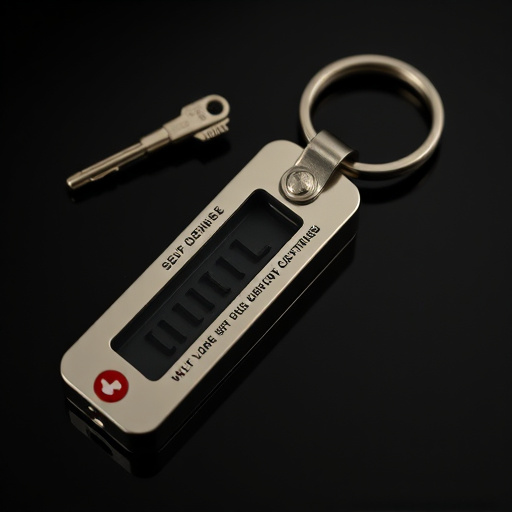Understanding the legal definition of an impact-resistant keychain weapon is crucial for self-defense, encompassing portable devices designed for causing bodily harm or inducing fear. Crafted from durable materials like high-strength steel or ceramic, these keychains are compact and capable of withstanding impact. Choosing one requires adhering to state guidelines on size, shape, and functionality, with US laws varying significantly by state. Prioritize materials like stainless steel or titanium for durability, secure locking mechanisms for safety, and designs meeting industry standards to minimize harm and avoid legal issues.
In today’s world, personal safety is paramount. Exploring self-defense options has become more accessible with innovative tools like impact-resistant keychains. However, understanding legal requirements surrounding these devices is crucial before investing in self-protection. This article delves into the intricacies of state-specific regulations, material considerations, and what constitutes a legally sound keychain weapon. By examining these factors, you can make informed decisions while ensuring your safety without legal repercussions.
- Understanding Legal Definitions: What Constitutes a Keychain Weapon?
- Material Considerations: Choosing Safe and Legal Self-Defense Options
- State-Specific Regulations: A Deep Dive into Legal Requirements
- Impact Resistant Design: Ensuring Effectiveness Without Legal Ramifications
Understanding Legal Definitions: What Constitutes a Keychain Weapon?
In discussing self-defense keychain legal requirements, it’s crucial to understand how laws define what constitutes a keychain weapon. The term ‘keychain weapon’ refers to any portable device designed or adapted for the purpose of causing bodily harm or fear of such harm. Keychains with impact-resistant materials and sharp edges can fall under this category, making them subject to legal regulations.
The definition extends beyond conventional weapons; it includes objects that can be used as a tool for self-defense. Impact-resistant keychain weapons, often crafted from durable materials like high-strength steel or ceramic, are designed to protect against physical threats. The key is not only in their compact size and portability but also in the material’s ability to withstand impact and potentially cause injury.
Material Considerations: Choosing Safe and Legal Self-Defense Options
When selecting a self-defense keychain, material considerations are crucial for ensuring both effectiveness and legality. Opting for impact-resistant materials such as high-quality steel or aluminum ensures that your keychain can withstand intense forces during an emergency, making it a reliable tool. These robust materials also contribute to its longevity, guaranteeing that your self-defense option remains functional over time.
Legal requirements vary by state, but generally, the keychains must adhere to specific guidelines regarding size, shape, and functionality. Choosing materials that meet these standards is essential. For instance, ensuring the keychain’s sharp edges are concealed within a protective casing or design helps avoid accidental injuries and reduces the risk of legal repercussions. Always research and understand the local laws to select a safe and legal self-defense option, prioritizing your safety without compromising on effectiveness.
State-Specific Regulations: A Deep Dive into Legal Requirements
In the United States, the legal landscape surrounding self-defense keychains varies significantly from state to state. While many states allow the possession of certain types of self-defense weapons, including impact-resistant keychains, there are strict regulations that dictate their design, functionality, and accessibility. Key factors include material composition, size restrictions, and permitted places of carry. For instance, some states require these devices to be non-lethal and designed for personal safety only, limiting their potential as lethal weapons.
The specific legal requirements can vary widely, with certain states having more stringent rules than others. Materials used in manufacturing must adhere to state-mandated safety standards, ensuring that the keychain is impact-resistant without causing excessive harm. Possessing a self-defense keychain for personal protection may be legal in your state, but it’s crucial to understand and comply with local regulations to avoid potential legal repercussions. Always check with your local authorities or legal professionals for up-to-date information on state-specific regulations regarding impact-resistant keychain weapons.
Impact Resistant Design: Ensuring Effectiveness Without Legal Ramifications
When considering self-defense keychains, one crucial aspect is the impact-resistant design. These keychains are designed to be effective in various situations, but their legal status varies across states. To ensure legality and maximize effectiveness, look for materials that can withstand significant force without compromising structural integrity. High-quality metal alloys like stainless steel or titanium are popular choices due to their durability and resistance to impact.
The design should also prioritize safety features to prevent accidental deployment. A secure locking mechanism ensures the keychain remains intact during regular use, preventing any unintended activation. Moreover, a well-designed impact-resistant keychain should meet specific standards for force distribution and energy absorption, ensuring it doesn’t cause harm to the user or bystanders when used as intended—a critical factor in avoiding legal repercussions.
In conclusion, while self-defense is a personal right, it’s crucial to understand the legal landscape surrounding keychain weapons. By understanding state-specific regulations, choosing impact-resistant materials, and adhering to safe practices, you can protect yourself legally and effectively. Remember, knowledge of both the law and high-quality design are your best defenses in navigating this unique self-defense option.
